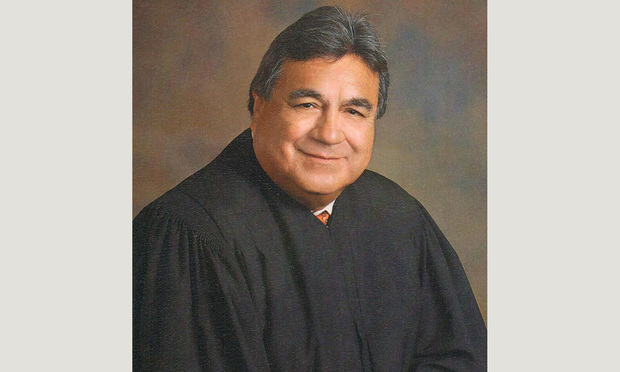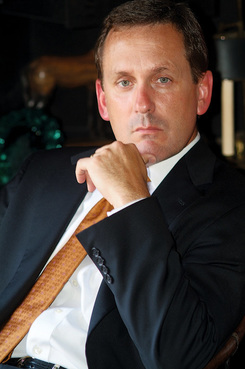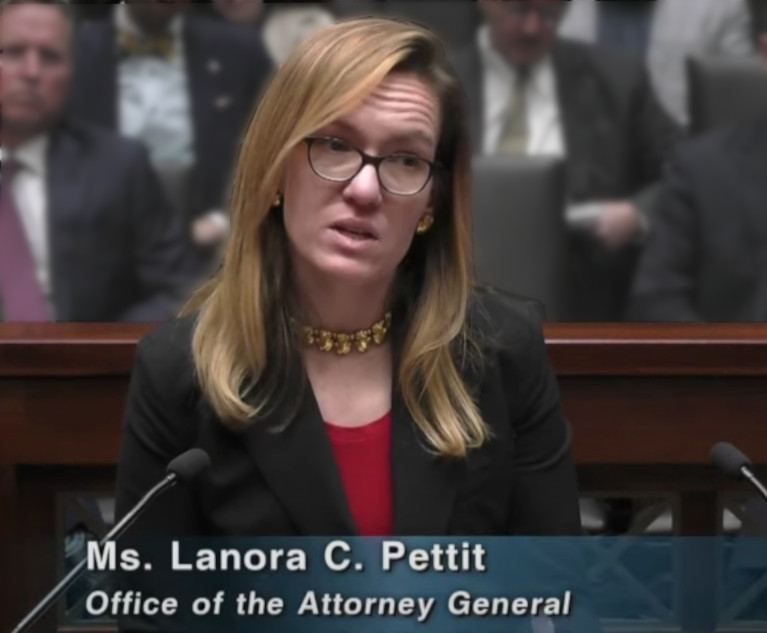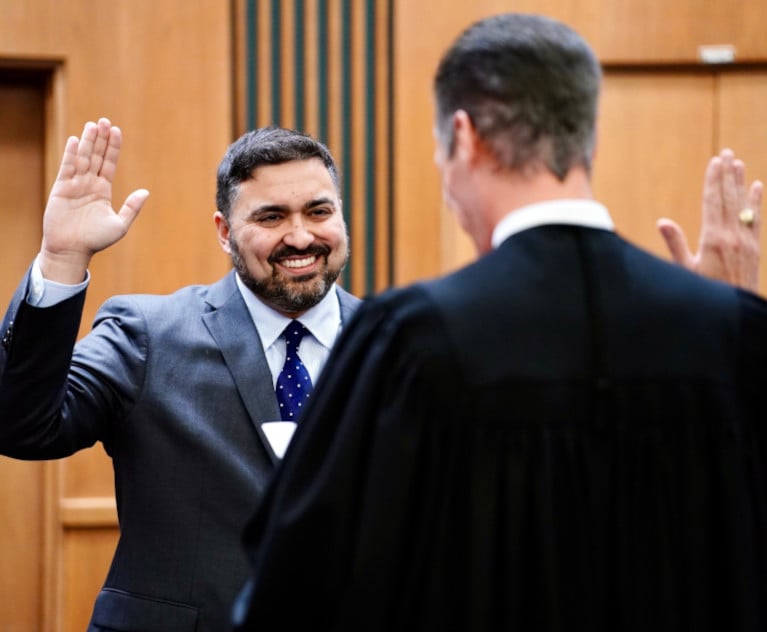Embattled Texas Judge Resigns, Seeks Acquittal of Bribery Conviction
“Lady Justice has a blindfold for a reason—to guard against the strong influence of human emotion on decisions affecting lives,” said McCrum Law Office founder Michael McCrum of San Antonio, who represents ex-Judge Rudy Delgado.
July 23, 2019 at 01:04 PM
4 minute read
 Rudy Delgado, former Judge of Hidalgo County's 93rd District Court.
Rudy Delgado, former Judge of Hidalgo County's 93rd District Court.
Rudy Delgado, the Texas judge who was convicted in a bribery scandal July 11, has asked the court to acquit him regardless of the jury's guilty verdict.
Delgado, former judge of Hidalgo County's 93rd District Court, took bribes from Edinburg solo practitioner Noe Perez in exchange for favorable rulings in criminal cases like granting personal bonds, dismissing charges and dismissing cases. A jury in the U.S. District Court for the Southern District of Texas in McAllen found him guilty of obstruction of justice, three counts of federal program bribery, three counts of Travel Act violations and conspiracy to commit bribery concerning programs receiving federal funds.
While his bribery case was pending, voters elected Delgado to the 13th Court of Appeals. The Texas Commission on Judicial Conducted suspended him before he took the bench. On July 19, he resigned the bench “with much regret,” said his resignation letter.
“Given the verdict in my case, and although I continue to have trust in our system of justice and remedies afforded all persons, I feel I should tender my resignation to serve the public interest,” Delgado wrote.
Delgado's motion for judgment of acquittal and motion for a new trial, filed Monday, said there's overwhelming evidence he lacked criminal intent, and that the government lacked evidence to prove certain elements of its allegations.
 Michael McCrum, McCrum Law Office, San Antonio
Michael McCrum, McCrum Law Office, San Antonio“Lady Justice has a blindfold for a reason—to guard against the strong influence of human emotion on decisions affecting lives,” said McCrum Law Office founder Michael McCrum of San Antonio, who represents Delgado. “Hopefully, the motion I prepared adequately puts the legal issues in their proper perspective. We believe our legal position is compelling.”
The motion said his conspiracy charge relied on a “speculative finding” that Delgado and Perez had an agreement that Perez was exchanging money, and in one instance a $15,000 truck, for Delgado's official actions.
“As Perez repeatedly testified, there was never a quid pro quo agreement between he and defendant,” the motion said. “He expressly testified there was no 'understanding' between the two to commit bribery.”
The bribery and Travel Act violation charges were based on assumptions that Delgado took the money with the express intent to take official actions, the motion said. It questions the propriety of the government's $5,000 valuation of one bribe, when Perez gave the judge just $260, and in exchange, Delgado granted a client a $5,000 personal bond.
“The Fifth Circuit looked at the amount paid by the briber to the official to determine the value,” the motion said.
Delgado maintains that the evidence proved Perez paid him $260 on two occasions to buy firewood, and a third time, gave $5,500 that was part campaign contribution and part donation to Delgado's charitable foundation.
Among other things, the motion said that the obstruction of justice charge—based on allegations that Delgado interfered with a grand jury investigation in a text message he sent to Perez saying his campaign contribution needed to be a check, not cash—lacked evidence that Delgado even knew about the grand jury or believed the text would obstruct an investigation. The motion said that U.S. Supreme Court precedent required the government to prove more.
“The jury must have been presented with proof beyond a reasonable doubt that defendant intentionally and actually impeded, influenced or obstructed a federal grand jury proceeding, or intentionally attempted to do so,” Delgado argued in the motion.
The motion said if the court doesn't grant Delgado an acquittal, then it should grant a new trial.
Angela Dodge, spokeswoman for the U.S. Attorney's Office for the Southern District of Texas, didn't immediately return an email seeking comment.
Related story: Guilty: Judge Rudy Delgado Convicted on All Counts in Judicial Bribery Case
Read Delgado's motion:
This content has been archived. It is available through our partners, LexisNexis® and Bloomberg Law.
To view this content, please continue to their sites.
Not a Lexis Subscriber?
Subscribe Now
Not a Bloomberg Law Subscriber?
Subscribe Now
NOT FOR REPRINT
© 2025 ALM Global, LLC, All Rights Reserved. Request academic re-use from www.copyright.com. All other uses, submit a request to [email protected]. For more information visit Asset & Logo Licensing.
You Might Like
View All


Trending Stories
- 1'Knowledge of Mismatch:' Fed Judge Offers Guidance on How to Hold Banks Accountable for Erroneous Transfers
- 2PAGA Claims Must Now Be 'Headed'
- 3Million-Dollar Verdict: Broward Jury Sides With Small Business
- 4'Reluctant to Trust'?: NY Courts Continue to Grapple With Complexities of Jury Diversity
- 5'Careless Execution' of Presidential Pardons Freed Convicted Sex Trafficker, US Judge Laments
Who Got The Work
J. Brugh Lower of Gibbons has entered an appearance for industrial equipment supplier Devco Corporation in a pending trademark infringement lawsuit. The suit, accusing the defendant of selling knock-off Graco products, was filed Dec. 18 in New Jersey District Court by Rivkin Radler on behalf of Graco Inc. and Graco Minnesota. The case, assigned to U.S. District Judge Zahid N. Quraishi, is 3:24-cv-11294, Graco Inc. et al v. Devco Corporation.
Who Got The Work
Rebecca Maller-Stein and Kent A. Yalowitz of Arnold & Porter Kaye Scholer have entered their appearances for Hanaco Venture Capital and its executives, Lior Prosor and David Frankel, in a pending securities lawsuit. The action, filed on Dec. 24 in New York Southern District Court by Zell, Aron & Co. on behalf of Goldeneye Advisors, accuses the defendants of negligently and fraudulently managing the plaintiff's $1 million investment. The case, assigned to U.S. District Judge Vernon S. Broderick, is 1:24-cv-09918, Goldeneye Advisors, LLC v. Hanaco Venture Capital, Ltd. et al.
Who Got The Work
Attorneys from A&O Shearman has stepped in as defense counsel for Toronto-Dominion Bank and other defendants in a pending securities class action. The suit, filed Dec. 11 in New York Southern District Court by Bleichmar Fonti & Auld, accuses the defendants of concealing the bank's 'pervasive' deficiencies in regards to its compliance with the Bank Secrecy Act and the quality of its anti-money laundering controls. The case, assigned to U.S. District Judge Arun Subramanian, is 1:24-cv-09445, Gonzalez v. The Toronto-Dominion Bank et al.
Who Got The Work
Crown Castle International, a Pennsylvania company providing shared communications infrastructure, has turned to Luke D. Wolf of Gordon Rees Scully Mansukhani to fend off a pending breach-of-contract lawsuit. The court action, filed Nov. 25 in Michigan Eastern District Court by Hooper Hathaway PC on behalf of The Town Residences LLC, accuses Crown Castle of failing to transfer approximately $30,000 in utility payments from T-Mobile in breach of a roof-top lease and assignment agreement. The case, assigned to U.S. District Judge Susan K. Declercq, is 2:24-cv-13131, The Town Residences LLC v. T-Mobile US, Inc. et al.
Who Got The Work
Wilfred P. Coronato and Daniel M. Schwartz of McCarter & English have stepped in as defense counsel to Electrolux Home Products Inc. in a pending product liability lawsuit. The court action, filed Nov. 26 in New York Eastern District Court by Poulos Lopiccolo PC and Nagel Rice LLP on behalf of David Stern, alleges that the defendant's refrigerators’ drawers and shelving repeatedly break and fall apart within months after purchase. The case, assigned to U.S. District Judge Joan M. Azrack, is 2:24-cv-08204, Stern v. Electrolux Home Products, Inc.
Featured Firms
Law Offices of Gary Martin Hays & Associates, P.C.
(470) 294-1674
Law Offices of Mark E. Salomone
(857) 444-6468
Smith & Hassler
(713) 739-1250







